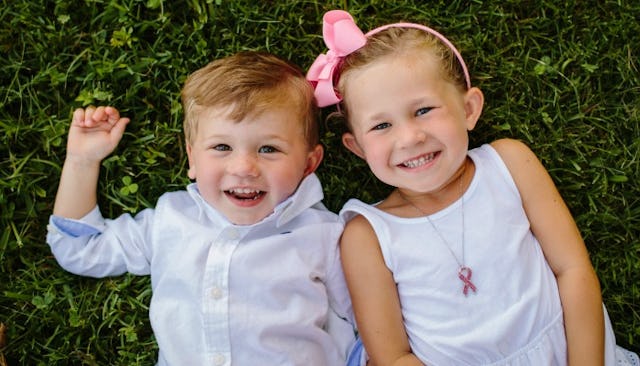Fighting Breast Cancer For The Next Generation

The leaves have started to change color and the corn mazes and haunted houses are on full display. Sound like October? You’re right, it is. And as predictably as the leaves change colors, America turns pink in honor of National Breast Cancer Awareness Month. Originally founded in 1985, it has become an annual health campaign that aims to increase awareness of breast cancer and help raise funds to support further research, prevention, diagnosis, treatment, and one day a cure.
It’s also a time in which we celebrate those who have fought this disease, remember those no longer with us, and support those who are in the midst of the battle. Throughout October, we are also reminded of some of the somber statistics regarding this disease that affects both men and women nationwide. According to the American Cancer Society, nearly 247,000 new cases of breast cancer will be diagnosed in women in 2016. Of those cases, nearly 40,000 of these patients will die. Furthermore, breast cancer is the second leading cause of cancer-related deaths in women and is now only 1% behind heart disease as the overall leading cause of death for females, according to the CDC.
It all sounds terrifying when you review the statistics. However, for me personally, I have a story of hope. The other side of the statistics, according to the American Cancer Society, is that in 2016, there are roughly 2.8 million breast cancer survivors in the United States. While I’m only one individual, I’m honored to be included in this statistic. I’m a 31-year-old survivor of breast cancer, and here is a small piece of my story.
As every October rolls around, I am reminded of my own family’s battle with this disease. This hasn’t been just one or two women in my family, this has been a fight from my great aunt’s and grandmother’s to my own mother, and in 2015, myself. Knowing my family’s history, I started getting screened for breast cancer at the age of 25. Then, in 2014, we were able to confirm that I was a carrier of the BRCA1 genetic mutation. It was in June of 2015, at a mammogram, that I was told by the radiologist that she had some concerns regarding what she was reviewing. Within seconds, my life flashed before my eyes. I had two young children and a husband at home and so many dreams to pursue. However, she didn’t have to say it, I knew what the doctor would tell me. I had breast cancer.
Heather Milburn
For me, October doesn’t only mean that fall is on its way or that it’s Breast Cancer Awareness Month. To me, October marks 17 years since my mother lost her battle with breast and ovarian cancer. It was a battle, like mine, that she did not choose, but nerveless fought with grace and integrity. A few weeks ago, I came across a small box of some of my mother’s most valuable possessions. It wasn’t any expensive jewelry, silver, or anything of monetary value. It was something you couldn’t put a price on; it was a collection of letters my grandmother had written to my mom in the 1960s while she was battling cancer.
The letters were from Ann Arbor, Michigan, where my grandmother would travel to get her treatments in hopes of granting her some additional time with her own young children. She received these treatments in Ann Arbor during the early stages of chemotherapy in an effort to help advance the treatment process for future patients battling this disease. Little did she know, the treatments she was “testing” would one day pave the way for not only her own daughter but also her granddaughter as well. The letters were beautiful and heartbreaking but also full of hope. One small part of one of letter reads, “Really Ann what can I do. All I want to do is lead a normal life. I precisely hope Ann that none of your children will ever have what I have. I have been fighting. I do believe that this chemotherapy is a breakthrough. It has been said that 3% have been cured.”
Heather Milburn
I’ve found myself reading this particular letter over and over the past few weeks — it’s so real and so genuine. To my grandmother, 3% was a breakthrough and that number gave the doctors and her so much hope. To me, that is amazing. Here we are, nearly 50 years later and we have come so far. However, we still have a way to go. Sometimes, I look at my children and nieces and nephews, and am overcome with a paralyzing fear from the thought that one day they may also be diagnosed with this terrible disease. Then I remember my grandmother’s words, my mom’s fight, and all the trials and advancements that have happened over the years and it eases my mind and strengthens my hope.
So, take a moment today to check yourself. It only takes a minute, but it could save your life. Look into genetic testing if your family has a history of cancer. Ask your doctor about mammograms and preventive measures. Be your own biggest advocate. No one knows your body like you do. In addition, encourage those around you to do the same. You could also save their life in doing so.
My story doesn’t end here — because of so many strong survivors before me, it’s just beginning. For that reason, I am going to do everything in my power to make sure my children, nieces, and nephews never have to see a day when they are faced with cancer. Breast cancer shouldn’t be defined by the month of October. It should be defined by the people who fight every day and the ones who pave the way for a better tomorrow.
[free_ebook]